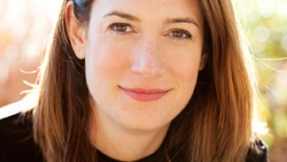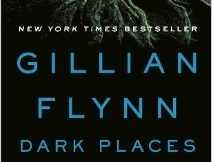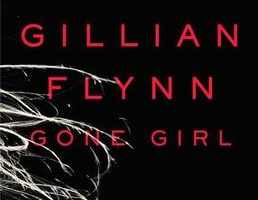Women in Gillian Flynn’s Mystery Novels: Villains and Victims

Gillian Flynn’s crime novels seem to have recently exploded in popularity, but she has been enjoying her success for a while now. Her first novel, Sharp Objects, was published in 2006, and since then, she has written two more: Dark Places and Gone Girl, both of which landed on the New York Times bestseller list. The Gone Girl movie will be released in theaters on October 3, 2014.
While Flynn had initially wanted to be a police reporter, she eventually chose to focus on writing. Her novels are eerie, suspenseful, and addicting, full of nuanced characters and unexpected plot twists. Although male authors and characters generally dominate the murder mystery genre, many intriguing female characters play central roles in Flynn’s novels. Flynn openly identifies as a feminist, yet some critics have stated that her portrayal of women is actually misogynistic. Like many of Flynn’s characters, this debate is complex and multifaceted.
Sharp Objects takes a look into the mind of Camille Preaker, who begins working as a journalist after being released from a psychiatric hospital. Her first assignment is to cover the murder of two preteen girls in her hometown of Wind Gap, which forces her to reconnect with her family and examine the psychological trauma of her own past. Sharp Objects is overflowing with twisted female characters. Camille herself struggled with self-harm and carved words all over her body, each of which hold meaning to her. Camille’s mother, Adora, is a strict, wealthy woman who rarely shows affection to Camille and instead favors her 13-year-old sister, Amma. Amma, Wind Gap’s resident “mean girl,” lives a double life by playing the role of perfect daughter to Adora, yet terrorizing others behind her back.
Readers and critics hold varying opinions on Flynn’s depictions of downright nasty women in Sharp Objects. Society teaches that women have inherent maternal instincts and should not be cruel without reason, yet the women of Wind Gap are portrayed as cold and calculating and seem to represent true evil. Some take this as Flynn challenging how women are “supposed” to act: tender, motherly, and pure. In Sharp Objects, they are psychologically disturbed, deeply damaged, and ruthless killers. Adora shows no real love to her children and hides many dark family secrets, while Amma is a merciless bully that stops at nothing to get what she wants. There are no damsels in distress in Sharp Objects. Instead, women play the roles of both victims and villains. This is a refreshing take on the classic murder mystery.
However, Flynn has also received criticism for Sharp Object’s female characters. They could be interpreted as shallow people merely acting cruelly out of boredom. With this in mind, Amma’s character in particular can be viewed as a problematic trope: the heartless, catty teenage “mean girl” with no depth who makes life a living hell for others. The other women in the town frequently engage in idle gossip, which plays on another stereotype of women. Camille manipulates and twists their gossip in order to get information about potential murder suspects. Camille must do what she has to in order to solve the murders, but some have criticized this move. Perhaps some of the harshest criticism has questioned if Flynn purposely wrote vicious, narcissistic female characters merely as a device to catch attention and succeed in a traditionally male genre.

Flynn’s second novel, Dark Places, is centered on protagonist Libby Day, a survivor of “The Satan Sacrifice of Kinnakee, Kansas,” in which her mother and two sisters were murdered in their home. This resulted in the incarceration of her brother Ben as the prime suspect. Years later, broke and alone, she is contacted by a group called the Kill Club, which is fixated on solving famous murder cases and believes that Ben is innocent. She agrees to help them for a fee, and in doing so, begins to question what really happened that fateful night. Outwardly nasty Libby is an odd character: she comes across as decidedly unlikeable, yet she’s painfully self aware of it, stating “There is a meanness inside of me, as real as an organ.” In fact, just as in Sharp Objects, none of the female characters are particularly likeable. Libby herself is selfish, lazy, and rude, yet her bad qualities pale in comparison to some of the other women in Dark Places. Her mother, Patty, comes across as helpless and ruined by a series of bad choices, while Ben’s girlfriend, Diondra, is an undeniably vile human with frightening, violent tendencies. At first, this parade of awful women can come across as misogynistic, but the male characters are portrayed in the same awful light. Some consider this Flynn’s peculiar feminist approach to writing female characters: if they are equal to men, they can be just as terrible.
Perhaps it was because of this balance that Dark Places received little criticism when it came to Flynn’s portrayal of women. However, Flynn’s most recent novel, Gone Girl, garnered a completely different response. Gone Girl focuses on married couple Nick and Amy, and Amy’s disappearance on their fifth wedding anniversary. Suspicions point towards Nick, but he maintains his innocence, and the media storm surrounding Amy’s disappearance causes every couple around to question their marriage.

Readers and critics took issue with a female character in Gone Girl making a false rape accusation as a plot point. Writing about such topics means entering dangerous territory: it certainly builds up an evil characterization, but perpetuates awful stereotypes about those who report their rapists and abusers. It is important to note that while not all rape victims are female, when readers are presented with this particular narrative in books or other forms of media, it typically involves a woman accusing an innocent man of raping her. Many already believe that false rape accusations are common and that manipulative women use rape and abuse charges as a tool to “get revenge” on men. The idea of women “crying rape” as a way of wielding power over a man’s future is used to demonize rape victims.
Because Flynn chose to include this plot point in Gone Girl, she has been accused of misogynistic characterization of women. However, Flynn has defended herself against this criticism, stating that she has chosen to write women who are truly morally depraved, without a tragic backstory of a man who wronged them and causes them to be that way.
Gillian Flynn has invited readers to look at women in a different way. Her female characters all have frightening dark sides that they are forced to acknowledge. They are not easy to read about, but perhaps this is what makes them so fascinating: women who are not tied up in pretty packages, women who are hard to swallow, challenge readers’ preconceptions of how women should act. Although Flynn sometimes writes about problematic ideas, she has a purpose in doing so. Feminism has helped to prove that women can be just as successful as men, but perhaps Flynn’s brand of feminism, one that shows women can be just as brutal as men, is equally important.
What do you think? Leave a comment.











Sharp Objects was a book with little plot, going nowhere. I kept waiting for something to start up, or some past mystery to unfold/resolve, but nothing.
It was just a story about cruelty and the heartlessness and boredom of women and girls living “it up” in small town Midwest. The narrator, now a Chicago reporter, returns to her hometown, Wind Gap, MO, on the tail of a young girl’s disappearance. Camille, the narrator, used to cut words into her skin as teenager, starting after the death of her 9 year old sister, and also because their mother was cold and unloving. Almost near the end, some “plot” is tacked on the that mother is that way because of Munchausen by Proxy Syndrome, and that she killed Camille’s sister, and is using that syndrome to make adult Camille and Camille’s 13 year old half-sister sick. The whole novel is about nothing but horrible cruelty by girls and tons of repressed sexual energy.
I didn’t like it. And I hated the way it was “resolved”. It reminded me way too much of “Isabella Moon”, which also meandered insanely and never had a real plot or resolution
This is the sort of book that makes you read interviews with its author because you need to know what she could possibly have been thinking when she wrote it.
Is it just me or does Flynn seem to be known for having at least one element in each book that makes some readers say “Oh, come ON.”
I enjoyed Gone Girl as an entertaining thriller and for Flynn’s crisp and sparkling writing, but its principal characters – the primed-for-perfection Amy and her witless spouse Nick- and the characterization of their sham marriage are too cartoonish and ridiculous to sustain deep themes.
Although there are elements of social satire, I’m taking it at face value as a literary thriller. The author invests her energy in confounding the reader with plot twists, skimming the surface of the superficiality of attraction and the fleeting nature of success.
Dark Places is a stunning book..couldn’t put it down!
There’s an enormous difference between Sharp Objects and Flynn’s second, excellent book, Dark Places. This is like the paler, slimmer kid sister to her second novel. It treads similar ground — women’s dark and evil sides; men wrongly accused — but is much more predictable.
Very nice article! I recently read Sharp Objects and was really struck by the fact that none of the women in it were good, not even Camille. It was a very enjoyable read though. I’ll need read to Dark Places sometime.
The biggest problem I had with Sharp Objects was that Camille, the narrator, is a truly horrible a person. All sorts of time is spent making her sympathetic. She wasn’t loved by her psycho mother, her sister died young, she’s a cutter who disfigured her otherwise beautiful body and she’s fresh out of the psych ward. But all that sympathy is destroyed by the author when she does drugs with her 13 tear old sister and then sleeps with a teenager (messed up by his sister’s murder and a suspect!) who’s still in high school (although he was 18 so that’s supposed to make it ok?). It can be fun reading about characters who are unlikable, but in this case I was just left disgusted asking myself, who would do that?
Not a fan of her work, but she had a astonishing debut.
While reading Sharp Objects, I found that it often made feeble attempts to point out how ridiculous the expectations of women were in the town of Wind gap, and then would stereotype and generalize the genders anyway. The “romantic” interest that Camille finds with both Richard and John were annoying to me. I found Camille’s recovery time between hospitalization for her cutting and working as a reporter unrealistic. I also felt that some parts of the story dragged on a bit and got repetitive.
The author could portray the mind of a sadistic, narcissistic sociopath making it Gone Girl a very dark piece, yet I actually didn’t find anything that happened a surprise.
I definitely enjoyed the twists and turns in Dark Places, but, I was just underwhelmed with it all. It’s no fun to read a book when there is essentially 300 pages of filler just to confirm what you figured out.
Great article! I think the characters that aren’t good are the most interesting, but not having any positive female character at all seems quite extreme. Interesting read.
I loved Gone Girl
I am a HUGE fan of Gillian Flynn and think her books are unbelievable. In my opinion, her character development goes above and beyond many mystery books I have read. However, when reading her books I had not considered the role that women played in her books so I really enjoyed your article and found it really enlightening.
I finally finished reading all three novels. The linking trait I also saw with the female leads are that they are women that you don’t particular like, and never want to be like. They are such different characters from other novels where we want to see good and bad and still like them. I strongly disliked all of Flynn’s protagonists from the first few chapters, but the uniqueness of this and her storytelling kept me reading all night.
I find Gillian Flynn’s novels very readable and I did think of her as a feminist, but after further thought I wonder if there really is anything new or feminist about having a ‘female villain’? A femme fatale is a very common trope in psychological thrillers, and not necessarily feminist. Also, that’s a very interesting point about how ‘Gone Girl’ perpetuates the myth of women ‘crying rape’. I hadn’t thought about it in that way before. I think I like Gillian Flynn novels just a little bit less now… Oh well. But good article, thanks.
Gone Girl ended up being a good film.